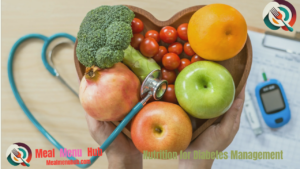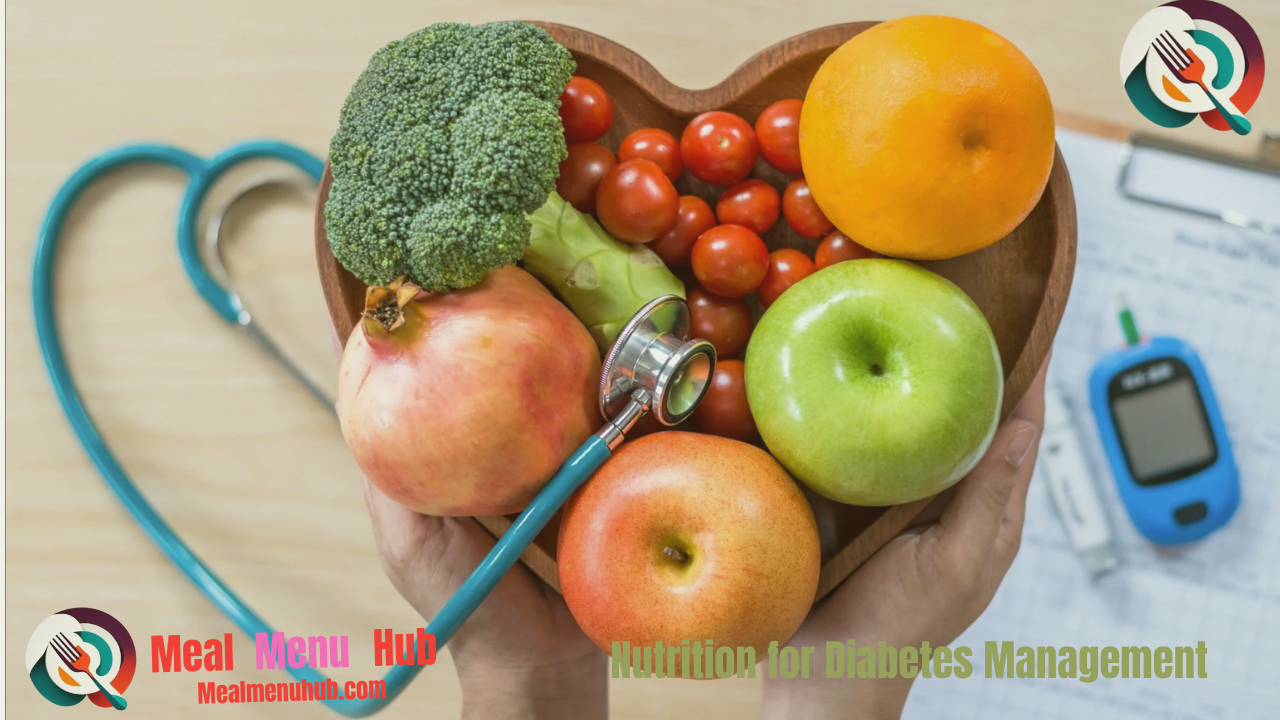Introduction to Diabetes and the Role of Nutrition
Nutrition for Diabetes Management Diabetes is a chronic condition that affects how your body processes blood sugar (glucose). There are two main types of diabetes: Type 1 and Type 2. Type 1 diabetes occurs when the body does not produce insulin, while Type 2 diabetes is characterized by insulin resistance. Regardless of the type, managing blood sugar levels is crucial to prevent complications.

Nutrition plays a central role in diabetes management. The foods you eat directly affect your blood sugar levels, and making informed dietary choices can help you maintain better control over your health. A balanced, nutrient-rich diet can support healthy blood sugar levels, enhance insulin sensitivity, and prevent complications associated with diabetes.
The Basics of Diabetes Management
Blood sugar, or glucose, is your body’s primary source of energy. Insulin is a hormone produced by the pancreas that helps your cells absorb glucose from the bloodstream. In diabetes, the body either doesn’t produce enough insulin (Type 1) or becomes resistant to its effects (Type 2), leading to elevated blood sugar levels.
Managing diabetes involves controlling blood sugar levels, often through a combination of dietary changes, regular exercise, and medication. Nutrition plays a key role in this process, as certain foods can raise blood sugar levels more quickly than others.
Key Nutritional Principles for Diabetes Management
Managing diabetes through diet involves understanding key nutritional principles that help stabilize blood sugar:
Balanced Meals
A healthy meal for someone with diabetes should contain a balance of protein, healthy fats, and complex carbohydrates. This combination helps prevent rapid spikes in blood sugar and keeps energy levels stable.
Low Glycemic Index Foods
Foods with a low glycemic index (GI) are digested more slowly, preventing sharp rises in blood sugar. Low-GI foods include whole grains, legumes, non-starchy vegetables, and most fruits.
Portion Control and Meal Timing
Controlling portion sizes and eating at regular intervals throughout the day are crucial for blood sugar management. Smaller, more frequent meals prevent large fluctuations in blood sugar.
Foods to Eat for Diabetes Control
Certain foods are more beneficial for managing diabetes, as they help stabilize blood sugar levels and provide essential nutrients. These include:
Non-Starchy Vegetables
These vegetables are low in calories and carbohydrates and rich in fiber, vitamins, and minerals. Examples include:
- Spinach, kale, and other leafy greens
- Broccoli, cauliflower, and Brussels sprouts
- Zucchini, cucumbers, and peppers
Lean Proteins and Healthy Fats
Protein helps control hunger and stabilize blood sugar. Healthy fats can improve insulin sensitivity. Include:
- Skinless poultry, lean cuts of meat, fish, and seafood
- Plant-based proteins such as beans, lentils, tofu, and tempeh
- Healthy fats from nuts, seeds, avocado, and olive oil
Whole Grains and Legumes
Whole grains and legumes are rich in fiber and have a lower glycemic index than refined grains. Opt for:
- Brown rice, quinoa, oats, and whole-wheat bread
- Beans, lentils, chickpeas, and peas
Low Glycemic Fruits
Fruits are an important source of vitamins, fiber, and antioxidants. However, some fruits can cause blood sugar spikes. Stick to low-GI fruits like:
- Apples, pears, and berries (blueberries, strawberries, raspberries)
- Citrus fruits like oranges and grapefruits
Dairy and Plant-Based Alternatives
Low-fat or non-fat dairy options provide protein and calcium without the added saturated fat. If you’re lactose intolerant or prefer plant-based options:
- Choose unsweetened almond milk, soy milk, or oat milk
Foods to Avoid or Limit
Certain foods can cause rapid spikes in blood sugar and should be avoided or consumed in moderation:
Refined Sugars and Sugary Drinks
- Soda, sweetened teas, fruit juices, and energy drinks
- Candy, baked goods, and sugary cereals
Processed and Refined Carbohydrates
- White bread, pasta, and rice made from refined flour
- Packaged snacks and chips
High Glycemic Index Foods
- White potatoes, watermelon, and some high-sugar fruits like bananas
- Processed foods and packaged desserts
Alcohol Consumption
Moderate alcohol consumption is generally fine for people with diabetes, but it’s important to monitor how alcohol affects your blood sugar. Alcohol can cause a drop in blood sugar, so it’s important to drink responsibly and always with food.
Sample Diabetes-Friendly Meal Plan
Here’s an example of a diabetes-friendly meal plan that includes balanced, nutrient-dense foods:
Breakfast:
- Scrambled eggs with spinach and tomatoes
- Whole-wheat toast with avocado
- A small serving of mixed berries
Lunch:
- Grilled chicken salad with mixed greens, cucumbers, and olive oil vinaigrette
- A small serving of quinoa or brown rice
Dinner:
- Baked salmon with roasted Brussels sprouts and sweet potato
- A side of sautéed kale with garlic and olive oil
Snacks:
- A handful of almonds
- Greek yogurt with chia seeds and a few raspberries
How to Monitor Blood Sugar Levels
Regular blood sugar testing is a vital part of diabetes management. You should check your blood sugar levels as recommended by your healthcare provider, usually before meals and 1–2 hours after meals. This will help you understand how different foods and activities affect your blood sugar levels.
The Role of Exercise in Diabetes Management
Exercise is a key component in managing diabetes. Physical activity helps your body use insulin more effectively and lowers blood sugar levels. The American Diabetes Association recommends at least 150 minutes of moderate aerobic exercise per week, such as brisk walking or swimming.
Strength training exercises can also improve insulin sensitivity and help with weight management.
Managing Diabetes Through Consistent Meal Timing
Eating meals at regular intervals throughout the day helps maintain stable blood sugar levels. Aim for three balanced meals a day with healthy snacks in between. This approach prevents your blood sugar from spiking or dropping too low.
The Impact of Fiber on Diabetes Control
Fiber helps slow down the absorption of sugar into the bloodstream, preventing blood sugar spikes. A diet high in fiber can help control blood sugar levels and improve overall gut health. Focus on fiber-rich foods like whole grains, vegetables, fruits, legumes, and nuts.
How to Deal with Cravings and Emotional Eating
Managing cravings and emotional eating is important for blood sugar control. When you’re craving something sweet or unhealthy, try reaching for healthier alternatives, such as fresh fruit or a small portion of dark chocolate. Practice mindful eating and avoid eating when you’re stressed or emotional.
The Importance of Hydration for Diabetes Management
Proper hydration is crucial for managing blood sugar levels. Drinking plenty of water helps the kidneys remove excess glucose from the bloodstream. Water is the best beverage choice for people with diabetes, but you can also try unsweetened herbal teas.
Supplements and Vitamins for Diabetes
Some supplements and vitamins may support blood sugar regulation. Popular options include:
- Chromium: May help improve insulin sensitivity
- Vitamin D: Low levels have been linked to insulin resistance
- Magnesium: Important for insulin function
Always consult with a healthcare professional before starting any new supplements.
Expert Advice and Research on Diabetes Nutrition
Healthcare professionals, including dietitians and endocrinologists, can provide personalized nutrition advice for managing diabetes. Research continues to highlight the importance of a low-glycemic, high-fiber diet in improving insulin sensitivity and controlling blood sugar levels.
Conclusion: The Power of Nutrition in Diabetes Management
Nutrition plays a pivotal role in managing diabetes. By making informed food choices, focusing on balanced meals, controlling portions, and staying active, you can effectively manage your blood sugar and live a healthy, fulfilling life. With the right diet and lifestyle adjustments, you can reduce the risks associated with diabetes and improve your overall quality of life.
FAQs About Nutrition for Diabetes Management
1. Can I eat carbs with diabetes?
Yes, but focus on complex carbs such as whole grains, legumes, and vegetables, which have a lower glycemic index.
2. How can I manage sugar cravings?
Try satisfying cravings with low-GI fruits, a small piece of dark chocolate, or unsweetened yogurt with fruit.
3. Is it okay to eat fruit if I have diabetes?
Yes, but choose low-GI fruits like berries, apples, and citrus, and avoid high-sugar fruits in large quantities.
4. Should I avoid all sugar if I have diabetes?
You don’t need to completely avoid sugar, but limit refined sugars and opt for natural sweeteners like stevia or monk fruit.
5. How often should I test my blood sugar?
Follow your healthcare provider’s advice on how often to test, typically before meals and after eating
